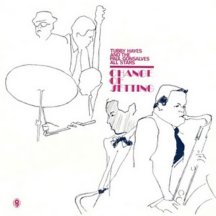 Change of Setting World Record Club T-631 Recorded February 15th 1965, London, UK |
Personnel
Paul Gonsalves - Tenor saxophone Tubby Hayes - Tenor Saxophone Ronnie Scott - Tenor Saxophone Tony Coe - Alto & Tenor Saxophone / Flute Jackie Sharpe - Baritone Saxophone Ray Nance - Trumpet / Violin Terry Shannon- Piano John Lamb - Bass Ronnie Stephenson - Drums |
Track Listing
1. Change of Setting (Hayes) 2. Royal Flush (South) 3. Childs Fancy (Crombie) 4. Min And Madge Blues (Condon) 5. Debs Delight (Crombie) 6. Tubbys Theme (Hayes) 7. Speedy Gonsalves (Condon) 8. Don't Fall Off That Bridge (Hayes) |
The personnel on this valuable World Record Club issue includes two long-prominent members of Duke Ellington's great orchestra, Ray Nance, who besides playing fine trumpet is also a unique jazz violinist, and Paul Gonsalves, one of the most individual tenor players around. With them are several of the finest jazz musicians produced by this country. The rhythm section is a well-integrated and firmly swinging one with Terry Shannon a particularly sympathetic accompanist, but inevitably it is the horns that most attract the ear. It says a great deal for the maturity of British jazz that Tubby Hayes and Ronnie Scott can solo beside an internationally-recognised star like Gonsalves without suffering in comparison. Scott has been part of the local modern jazz scene ever since it existed, of course. Hayes is one of the technically best equipped players in the land, and is also that rarity, a convincing multi-instrumentalist.
These, then, are the main soloists, but on this disc the writing is important as well. Since the nineteen-fifties a lot of jazz recording dates have been based on the quintet formula of trumpet, saxophone and three rhythm. There is nothing wrong with this, although the overall sound can be rather thin and monotonous except in the most skilled hands. It is a pleasant change, however, to listen to the deep, full voicing's of this ensemble. The three tenor saxophones dominate, of course, but extra light and shade are given by Tony Coe's alto and Jackie Sharpe's baritone. The individual soloists emerge from and fade back into the reed section's rich pattern of sound which sustain them and add another dimension to their improvisations.
All the compositions are by local jazzmen and several of them are striking. Hayes Change of Setting is tuneful and includes a solo by Gonsalves and a characteristical one from the composer. Gonsalves, who is heard first, appears to possess the seen of endless melody. One phrase grows out of the next in what seems so natural a way that it can easily be underrated; what we are actually hearing is an exceptional faculty for melodic invention at work. Royal Flush proves to be a rather moody Harry South piec with especially good saxophone scoring. This time Gonsalves's solo is short but his tor is instantly recognisable. Tony Crombie's Child's Fancy is the first of two settings fc Nance's violin. Its romantic tones are heard amidst lush saxophone chords and conrtrol is provided by the more business-like voice of the piano. Min and Madge Blues Les Condon contains Nance's only trumpet solo here. He blows briefly over the full ensemble and, as with Gonsalves, it is intriguing to hear him out of the Ellington seting. Terry Shannon takes his only solo on this one, too.
Miles Davis once said drummers make good writers because they have "a good sense of space". You can hear what he meant in Tony Crombie's second piece, Deb's Delight, Gonsalves and Hayes both solo on this. For contrast Paul plays over the other horns, Tubby with only rhythm section backing. Jackie Sharpe is heard as well. Tubby's Theme is a nice tune and its composer has a long, agile and inventive flute solo. Despite its title, Speedy Gonsalves features Nance's violin, this time with Latin percussion. Les Condon is again the composer and there are offerings from Gonsalves and Hayes, the latter vibraharp. It is curious that with flute and vibraharp Tubby displays a very different musical personality than that familiar from his tenor work: gentleness and melodic elegance replace aggression and exultant mobility. The final track, Don't Fall Off the Bridge is an up-tempo Hayes composition. Mainly it's a work-out for the three tenors, and exciting one.
MAX HARRISON (Jazz Monthly)